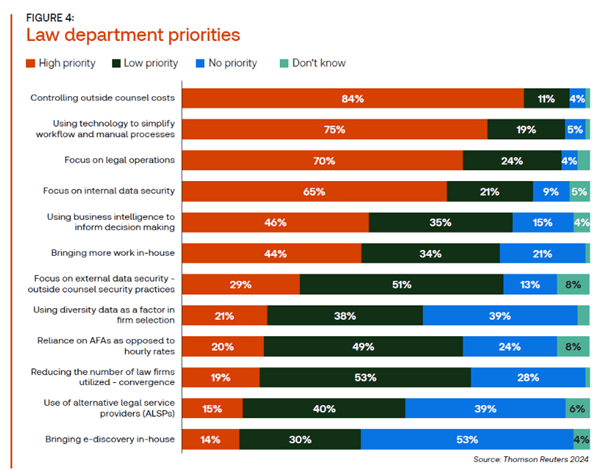All in-house lawyers have this goal: delivering high-quality legal services at lower cost and with better results. Typically, you can solve part of the equation but only at the expense of the other parts. For example, you can get lower costs, but not always higher (or even the same) quality. Moreover, given their workload and other priorities, it’s a challenge for in-house counsel to spend a lot of time trying to solve this problem.
Enter legal operations, a discipline that focuses on moving the administrative headaches present in all legal departments off of the shoulders of the lawyers and onto those of operations professionals. What started as a whisper a decade or so ago is now a roar. Below I discuss the evolution of legal operations and how in-house counsel can get and stay ahead of the curve.
The evolution of legal operations
The evolution of legal operations within in-house legal departments has transformed how legal services are delivered and managed, driven by a need for:
- Increased efficiency
- Cost control
- Alignment with business and strategic objectives of the business
Initially focused on simply managing external legal spend and minor administrative tasks, legal operations have expanded to encompass a wide range of functions within the legal department, including technology adoption, data analytics, project management, and process improvement. This expansion is fueled by advances in legal tech and a growing emphasis on operational excellence as table stakes for any legal department, i.e., enabling legal teams to streamline workflows, reduce costs, and provide more strategic value. From what was once a lower-level job, legal operations professionals often play a critical leadership role in the legal department, bridging the gap between legal and business teams through (i) metrics-driven decision-making, (ii) resource optimization, and (iii) innovation that empowers the legal department to act as a true business and strategic partner – and just a cost center. All of this is evident in a recent Thomson Reuters survey of legal departments: 
What is legal operations?
Legal operations is a person or group of persons who look to take on all of the tasks that do not require a law degree, freeing up in-house lawyers to focus on legal work. This alone is reason enough to develop a legal operations function. When in-house lawyers have time to focus on legal problems and not administrative problems, performance improves as more legal work gets done with more thought and attention (and with less need for outside counsel). On a more granular level, a legal operations team focuses on things that drive efficiency within the legal department by allowing the legal team to operate based on data and not guesses, driving efficiency through metrics. This allows the legal team to “do more with less,” turning what is usually a budget-time slogan into reality.
 |
plan
The legal operations group typically sits within the legal function, usually reporting to the general counsel. It is responsible for the “operations” of the legal department. Operations can mean many different things. Most legal operations groups focus on financial matters because that is where the biggest benefit lies, like getting the legal department on firm financial footing with accurate forecasting and accruals of legal spending and identifying the right firm for the right project at the right price. But there are many tasks that the operations group can perform, and smart general counsel realize this – using the team for everything from financial analysis to strategic planning to data analytics. In some legal departments, the head of legal operations also serves as chief of staff.
What can it do?
Here is a non-exhaustive list of things a legal operations function can do to enhance efficiency and reduce costs:
Strategic planning
- Partner with the general counsel and assist with driving her/his vision
- Create Legal KPI’s and yearly goals for the department
- Succession planning
- Create a strategic plan for the legal department
- Prepare materials for the general counsel to use during yearly reviews
Financial planning
- Prepare and set budgets
- Operate the e-Billing system
- Accruals and spending forecasting
- Negotiate (and monitor) alternative fee arrangements
- Manage outside counsel and other legal vendors
- Financial reporting (within the legal department and outside the legal department)
- Create legal department dashboards
Operational/analytics
- Staffing
- Data analytics and metrics
- Find process improvements (including how to “scale” legal services delivery to meet the growing needs of the company)
- Continuing Legal Education (CLE)/Professional development
- Attorney licensing
- Contract management
- Pro Bono program management
- Knowledge management
- Records management
- Determine legal process improvements
- Plan legal department meetings, including off-sites and other activities
- Legal project management
- Create board of directors presentations
- Satisfaction surveys (business clients, internal to the department)
Technology
- Vet, test, and implement new technologies, like generative AI (and train individuals on how to use the various technologies already used by the department)
- Maintain technology used by the department
If you add up the time spent per month by in-house lawyers on the tasks identified above, the math becomes clear. There are huge efficiencies and cost savings available for the taking by any size legal department willing to make the investment.
Why do you hire and how do you get this off the ground?
While many legal operations professionals are lawyers with in-house experience, they do not need to be. Someone with a strong financial background, MBA or CPA, would make an excellent choice. All you really need is someone who is smart, self-motivated, good with numbers, at ease with technology, and a leader. The ability to be extremely knowledgeable about the business of the company is also important.
One hurdle for creating a legal operations role within a legal department is the naturally conservative nature of lawyers. Most in-house lawyers prefer the status quo and jumping on “crazy new things” is just not the way of most of them behave, especially in an environment where mistakes can reflect poorly on them and the legal team regardless of the often-mouthed assurances from senior management that failure is welcomed within the company as a “learning experience.” That’s rarely how it really works. In the end, it often comes down to math, or, how much money can this group save the company? Show the math, get the person.
One common question is, “If there is money for an operations role, is that the best way for the legal department to spend those dollars as opposed to, say, another lawyer?” Fair. There is also skepticism about the value of legal operations – does the math really work out? What if my department is small – will I get the same value from legal operations as a mega-sized department? Another roadblock is the age-old question of, “Where do I find the time to work on setting up legal operations when I cannot get to all of the work I already have on my plate?” Finally, and perhaps the biggest obstacle is the lack of willingness by the general counsel to let go of many of these operational tasks, a feeling that if the general counsel is not “in charge” of operating the legal department then they are somehow failing. Delegation is, and will likely always be, the general counsel’s hardest task with legal operations being their ultimate delegation challenge. So, you might ask, why take the risk? In short, because of the payoff in cost savings and efficiency can be huge.
How do I get started?
If you are just starting out with legal operations, don’t feel like you need to go straight to calculus. Some basic addition and subtraction is just fine when getting your feet wet. In other words, find the easy wins to get things started and to prove the value of the operations role. For example:
- Implementing e-signature technology
- Implementing (or enhancing) e-billing, budget tracking and metrics
- Basic vendor management
- Enhanced invoice review
- Strategic planning
- KPI creation and dashboard management
- Knowledge capture and management
- Simple work-flow processing improvement that can pay off big with minimal resources expended
- Use of generative AI within the department
Your goal should be to go back to the CEO and/or CFO at six-months and one year later and present your results. The odds are good that they will like what they hear if you focus on the easy stuff first.
If you think that a legal operations group could help your legal department or want to learn more, there are some great resources to get the process underway. Start with reading the materials on the CLOC and ACC Legal Operations websites. Membership is inexpensive and, even if you’re not a member, there are many free resources available to help you get started. Check out LegalOps.com, a site dedicated to legal operations (and sign up for the free newsletter). The ACC’s seminal Legal Operations: Leading Practices in Implementing Strategy, Leading Change, and Advancing Law Department Excellence is a must have. Lastly, attending a conference dedicated to operations is an excellent and relatively inexpensive way to get caught up.
Legal operations are not just for mega-size legal departments. The math varies but somewhere between 25% to 50% of in-house legal departments (of all sizes) have created legal operations functions but that number is only going to grow – here in the US and internationally. All in-house legal teams should take a hard look at how a legal operations function would improve service and reduce costs.
If you have access to Practical Law, you have access to many of the resources needed to get a legal operations function off the ground quickly and with maximum benefit. And the Thomson Reuters legal operations archive is a free resource to help you get started.
 |










